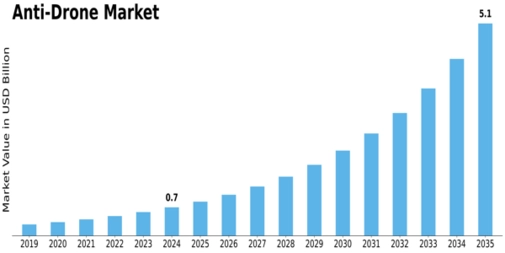-
Новости
- ECOSYSTEM
- ИССЛЕДОВАТЬ
-
Страницы
-
Группы
-
Мероприятия
-
Статьи пользователей
The Rise of Counter-UAV Systems: Trends Shaping the Future Anti-Drone Market

Understanding the competitive topology is critical for entrants, investors, and incumbents. Drawing on MRFR, related analysis, and industry news, here’s a snapshot:
Anti-Drone Market Key Players & Positioning
Leading companies cited in MRFR include: Lockheed Martin, Rafael Advanced Defense Systems (Israel), IAI, Leonardo, Thales, Saab, DroneShield, Dedrone, and RTX.
Differentiation Strategies
-
Technology leadership (e.g. advanced directed-energy, AI algorithms)
-
Modularity & system integration capabilities
-
Global presence and defense contracts
-
Patents, IP, and rapid R&D cycles
-
Aftermarket services, upgrades & support
Emerging Players & Disruptors
-
Startups such as Epirus recently secured a USD 250 million funding round to scale anti-drone weapons (notably their Leonidas product) to broader markets.
-
Firms from non-traditional defense backgrounds entering via software, AI, or sensor technologies.
-
Regional firms, particularly in Asia, seeking to supply localized solutions aligning with defense modernization efforts.
Market Dynamics & Competitive Challenges
-
Rapid technology obsolescence: Players must constantly upgrade to counter next-gen drones.
-
Scale vs niche focus trade-off: Generalists vs specialization in micro-drones, swarm defense, or specific domains (airport, naval).
-
Barriers to entry: High R&D cost, regulatory hurdles, trust/credentials in defense contracts.
-
Consolidation potential: M&A among mid-tier firms by major defense contractors is likely.
-
Partnerships & alliances: Original equipment manufacturers (OEMs), system integrators, state agencies, and cross-licensing can reshape competitive positioning.
Strategic Moves to Watch
-
Vertical integration (hardware + software + services)
-
Acquisition of AI / sensor start-ups
-
Formation of joint ventures for local market access (especially in APAC)
-
Licensing / platform-as-a-service models
Conclusion: The anti-drone competitive landscape is dynamic, blending legacy defense giants with nimble technology entrants. For new players, the key is to target niches, build partnerships, and stay ahead on R&D.
- Art
- Causes
- Crafts
- Dance
- Drinks
- Film
- Fitness
- Food
- Игры
- Gardening
- Health
- Главная
- Literature
- Music
- Networking
- Другое
- Party
- Religion
- Shopping
- Sports
- Theater
- Wellness


